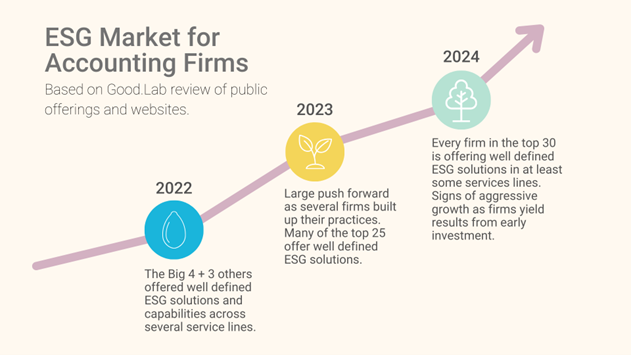Until recently, environmental, social and governance (ESG) reporting has been primarily market-driven by large, multinational companies looking to respond to consumer expectations. Around 98% of the 500 largest U.S. companies disclose ESG metrics.
However, we’ve now entered an era where the emergence of sustainability regulations and standards at international, federal and state levels has made transparent and reliable, quantitative reporting an essential part of doing business today. This requirement extends beyond just the largest organizations and is increasingly impacting thousands of middle market companies that make up their supply chains—potentially including many of your clients. This presents an enormous opportunity as they look to your firm for guidance as their trusted advisor.
I recently participated in an AICPA and CPA.com virtual ESG Update with more than 70 ESG-focused leaders across accounting and finance to dive into the current landscape and its impacts on the profession. Here are my top takeaways as you consider how to stay ahead of this growing opportunity and build your own capacity to deliver on client ESG needs.
Understand the ESG Regulatory Landscape
When we started Good.Lab, we thought our focus would be responding to Securities and Exchange Commission (SEC) climate disclosure rules. But today, there are new and proposed regulations emerging from multiple fronts, most notably from California and other states, and Europe, that will have far-reaching implications, albeit to differing degrees. The various regulations being at different stages of enactment and adoption adds even more complexity for impacted companies trying to navigate this evolving landscape.
-
The SEC Climate Disclosure Rule
The SEC Climate Disclosure rule, which focuses on the reporting of Scope 1 and 2 greenhouse gas (GHG) emissions and climate risk, will likely impact around 7,000 U.S. public companies. However, within days of the SEC adopting the new climate rule in March, multiple lawsuits were filed; there is currently a stay on the rule pending judicial review. There could be a verdict later this year, but the upcoming elections add further uncertainty. Despite this, most public companies are already preparing for it and leveraging ESG reporting frameworks.
-
“California Climate Accountability Package”
Meanwhile, California State Bills SB 261 and SB 253 have been signed into law and will require reporting in 2026, with 2025 data. They also include the more comprehensive Scope 3, requiring disclosure of indirect value chain emissions, in addition to climate risk. Companies doing business in California will require emissions data from their supply chain partners, regardless of which state their suppliers are located in. The two state bills are expected to create a downstream impact of around 15,000 companies.
-
EU Corporate Sustainability Reporting Directive (CRSD)
Additionally, Europe’s CSRD will directly affect roughly 3,000 U.S. businesses with large European operations or subsidiaries when it goes live in 2029. However, there will be a much larger indirect impact on American business from the 50,000 European businesses that will need to collect data all the way down their supply chain starting in 2025. Given that the CSRD requires companies to report on 1,144 data points across all factors of ESG, this will put immense pressure on companies that do business in the EU and want to continue doing so to expand their data collection and improve data accuracy. The AICPA has an upcoming webinar aimed at providing practitioners with guidance on how to navigate these complex requirements.
All these regulations have an assurance component, creating a significant opportunity for CPAs. According to a from The Center for Audit Quality, 70% of S&P 500 companies that reported ESG information in 2022 obtained assurance over it, but only 21% of those companies used public company auditors. CPAs are uniquely positioned to provide the level of quality and trust required for this assurance, and if they’re already auditing the financial statement, they understand the processes and controls that the company has in place.
Demystifying Emissions Reporting
The three levels of emissions are defined by the Greenhouse Gas Protocol (GGP):- Scope 1: Direct emissions from owned or controlled sources, such as company vehicles and on-site fuel combustion.
- Scope 2: Indirect emissions from the generation of purchased electricity, steam, heating, and cooling consumed by the company.
- Scope 3: All other indirect emissions that occur in a company's value chain, including upstream and downstream activities.
The largest impact will come from Scope 3 where market expectations will drive reporting for clients who may not fall under regulatory purview themselves.
Building a Robust ESG Strategy
Despite continued uncertainties, ESG reporting is here to stay and is becoming a critical component of business strategy. Firms that proactively establish strong ESG practices today are positioning themselves for significant growth and competitive advantage tomorrow. This trend is evident as top firms build out ESG services lines and forward-thinking clients increasingly turn to CPAs for expertise in ESG reporting and assurance.

A recent Good.Lab/CPA.com survey found that 58% of companies are already relying on their accounting firms as external vendors to ensure their ESG success. This growing reliance underscores the importance and opportunity for accounting firms to lead in the ESG space.
This starts with a robust strategy built on lead generation and scaling and having the proper tools in place to offer clients success from an effectiveness point of view, from a cost point of view and from a risk management point of view.
Over the next several months, much of the regulatory side of ESG reporting will be sorted out, and the firms that have built out a practice strategy and brand related to sustainability will be positioned for success. By understanding the regulatory landscape, investing in technology and committing to continuous education, firms can navigate the complexities of ESG reporting and seize the opportunities it presents.
To help you get started head to CPA.com/ESG. Additionally, be sure to take advantage of the following resources:
- Webinar: Navigating Supplier Sustainability Information Requests
- Why CPAs for assurance
- Sustainability Assurance Engagements Attestation Course
- Fundamentals of ESG Certificate Course
- ESG and Sustainable Financial Strategy Course (Partnership with Oxford)
About the author:
Guest author: Andries leads Good.Lab as Co-founder and CEO. Good.Lab is the leading ESG software for the middle market. Andries' career experience includes launching and growing multiple successful business offerings at the intersection of accounting and tech.
Prior to founding Good.Lab, Andries was a partner at Armanino, a top 20 public accounting firm.

